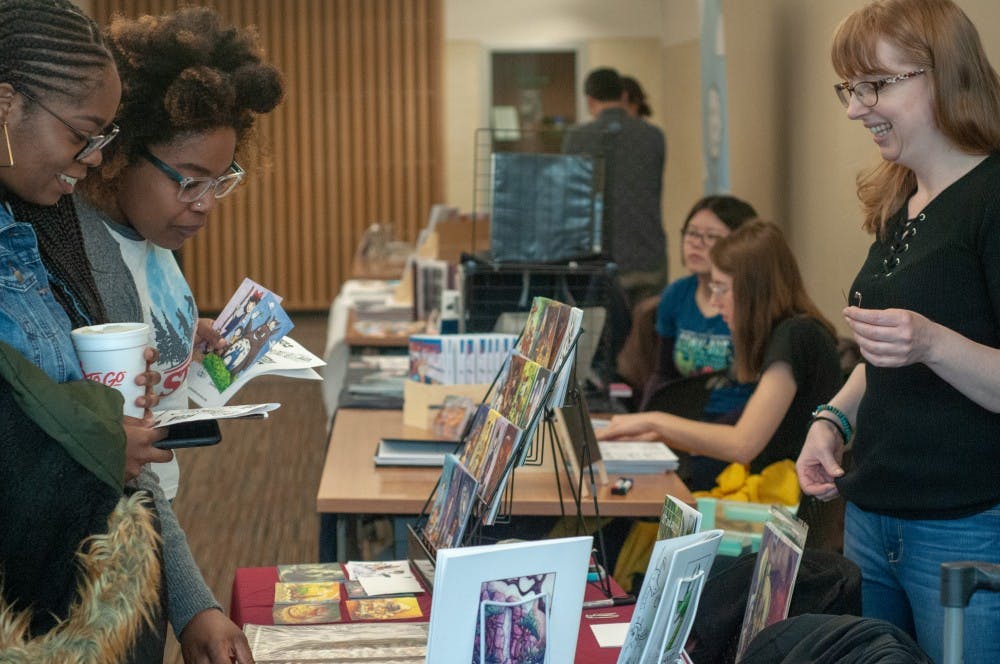Michigan State's comic book collection — the largest comic book collection in the world that holds over 300,000 items — was the center of the MSU Comics Forum, along with various panels, research presentations and discussions that addressed marginalized communities in comics.
Led by Comics Studio assistant professor Ryan Claytor, the forum closed out its 12th annual series on Saturday. The event caters to scholars, creators and fans.
“We are vehemently a comics event — all the artists ... are featuring comics, all of the scholars are talking about comics, all of our keynote speakers are talking about comics," Claytor said. "So this is a very honed comics event.”
The first event of the MSU Comic Forum looked into Muslim perspectives in the “Green Lanterns: Rage Planet” comic, which features both a Latina character and a Michigan native Muslim character. MSU alumnus Geoff Johns co-created the book and the characters.
However, the forum didn't just focus on DC and Marvel — the event included a wide-range of other comics and non-superhero content as well.
“It's not just capes and tights and funny animals. It's anything from autobiography to humor to horror, fiction, nonfiction – didactic comics," Claytor said. "Anything you can think of has been made in comics and the creators that we have in the artist alley definitely display that diversity in their work."
This final weekend of the forum featured scholarly research presentations and panels, a majority of which incorporated a social justice theme. Scholars looked into the impact of people of color, women and other marginalized groups in comic books.
“This is a place where we should be generating ideas, not just repeating old ideas, and just sort of being comfortable," Zach Kruse, who helped organize the event, said. "We should be starting conversations instead of letting other people just have them without us."
University of South Carolina professor Qiana Whitted, the keynote speaker, provided a look into the history of race, gender and representation in Entertaining Comics – better known as EC Comics. During her speech, she addressed the research she has been working on and her recently published book, “Race, Shock, and Social Protest."
“The focus of my book ... is on a profoundly influential type of story that EC writers and artists develop to directly engage the problems that Americans faced during the early Cold War and civil rights era," Whitted said during her keynote speech. "I analyze how the social protest comics draw upon the convention of EC’s signature genres to confront racial prejudice, religious intolerance, anti-communist rhetoric and other forms of social discrimination."
Other panels discussed similar topics, but explored more current comics and comics media. Subjects included issues of ignoring race and incest-like relationships in the television show, “The Flash," and bi-racialism and the race-swapping of characters in both the Spiderman comics and the Marvel movie, “Spiderman: Homecoming."
Additionally, there were panels that looked at the history of female sexuality during Cold War era comics and the depiction of the Holocaust and concentration camps during the “golden age” of comics.
While some of the panel speakers came from MSU, a variety of speakers came from various universities around the world. Omara Dyer-Johnson, a Black Studies Ph.D student from the University of Nottingham, gave a research presentation on the popular Marvel Comics series, “Black Panther.”
Dyer-Johnson talked about the “Intergalactic Empire of Wakanda” series, Afrofuturism and how the series is a direct parallel to the real-world issue of colonization. Her discussion centered around the different facets that colonization encompasses, including a robbing of history, self and ideas.
“It's really good to have that kind of space to discuss these things, especially within the medium of comic books,” Dyer-Johnson said. “We might discuss it in kind of the broader context — actual political and social issues, but talking about them and using imaginary spaces doesn't really happen very often. But I still think it's a fruitful place for discussion and it's nice to have that facilitated.”
Support student media!
Please consider donating to The State News and help fund the future of journalism.
Discussion
Share and discuss “12th annual MSU Comics Forum addresses marginalized communities ” on social media.







